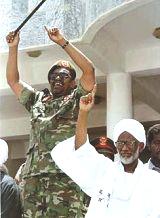Turabi calls for uprising against Sudan’s Bashir
Feb 12, 2007 (KHARTOUM) — The Secretary General of an opposition Islamist party has appealed Sudanese people for uprising against the Sudanese president. He further described the situation in the country as being grave.
 Hassan al-Turabi, the secretary-general of the Popular Congress Party, has called on political forces and civil society organizations to take to the streets in an uprising against the regime of Sudanese President Omar al-Bashir, similar to the October popular revolution of 1964 which toppled the regime of former President Ibrahim Aboud who had come to power through a military coup.
Hassan al-Turabi, the secretary-general of the Popular Congress Party, has called on political forces and civil society organizations to take to the streets in an uprising against the regime of Sudanese President Omar al-Bashir, similar to the October popular revolution of 1964 which toppled the regime of former President Ibrahim Aboud who had come to power through a military coup.
Al-Turabi said heatedly “we have learned the lesson after the harm done to us by military coups”. He urged political parties to wage elections through unifying ranks against Al-Bashir’s ruling party, the National Congress; Al-Sharq al-Awsat reported.
Speaking at the conclusion of his party’s congress for the Khartoum Governorate, Al-Turabi described conditions in the country as being “grave”. He urged all forces and organizations to go out on a single day to say their word, as they did before in October 1964.
Al-Turabi called for renouncing the style of military coups. He said that the party that undertakes such coups will be the first to suffer from them, citing the experience of his own party as an example. “We have learned the lesson once and for all,” he said.
He said that the parties must unite in one front in preparation for the 2008 election, on the basis of forgetting the past and its vendettas.
Al-Turabi said that the country has become in a situation which is worse than before. He warned that it could disintegrate in the event of continued conflicts and “agreements that come from outside the country”.
Turabi described conditions in the Darfur region as horrible. He denied at the Khartoum Governorate conference by his party that the scurry by the international community toward the Darfur was motivated by foreign ambitions. He expressed dismay at the deteriorating conditions in Darfur where he said there were “humanitarian sins”.
He further accused the government of repressing liberties. He said that the lack of justice domestically has brought in the International Criminal Court, adding that some influential persons fear they will meet the same fate as Serbia’s rulers.
He made redressing this situation contingent on reconciliation among the Sudanese. “Reconciliation among the people of Sudan can be revived and this can supersede international courts”, he said. He also urged the country’s leaders to allow new faces to have the opportunity for nomination in the presidential elections, referring in this context to the president’s announcement that he did not want to run for re-election.
(ST)
